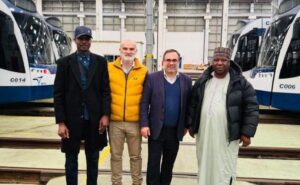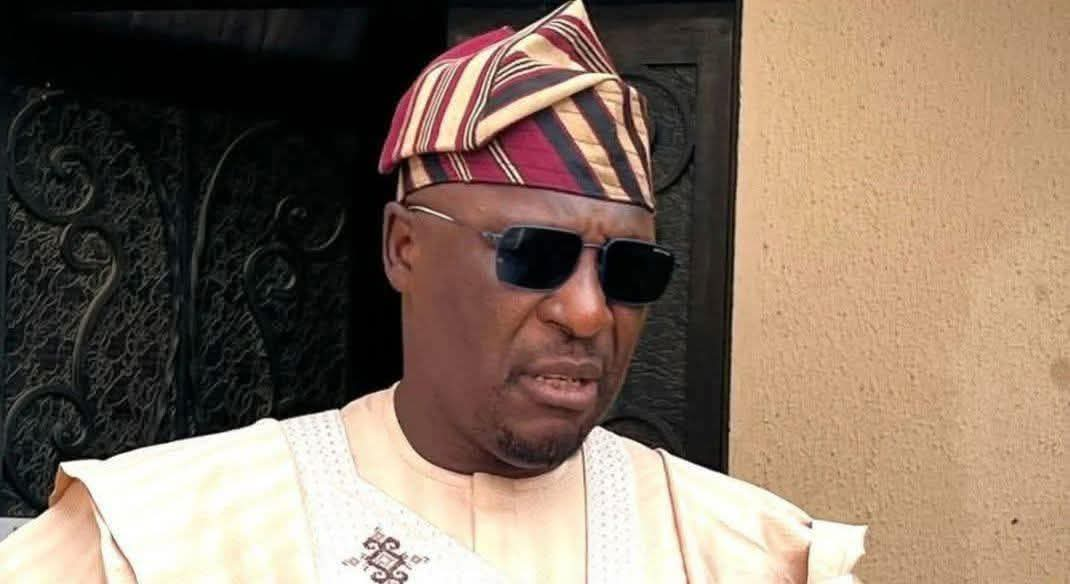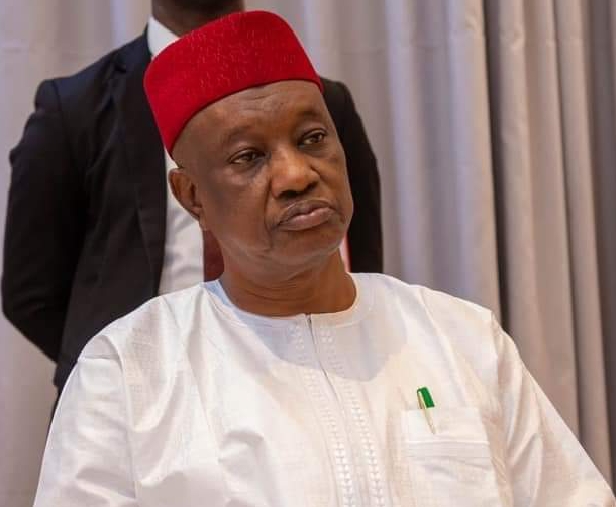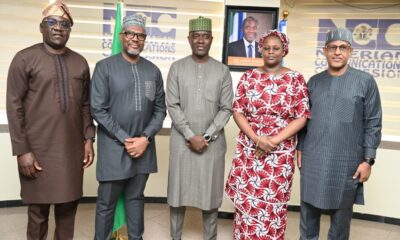Headlines
5G’ll offer great potential for Nigeria’s socio-economic development–NCC

Nigeria will derive huge socio-economic benefits from commercial deployment of the Fifth Generation (5G) Networks, which will come with great potentials that will bolster Nigeria’s socio economic ecosystem for quantifiable growth.
The Nigerian Communications Commission (NCC) stated this during a discussion with a broad spectrum of participants mostly made up of Nigerians at a special panel session sponsored and hosted by the Commission on Thursday as part of the programmes of the ongoing Social Media Week Lagos (SMWLagos2020).

L-R: Dr. Omoniyi Ibietan, Head Online Media & Special Publications; Engr. Bako Wakil, Director, Technical Standards & Network Integrity; Prof. Adeolu Akande, Chairman, Board of Commissioners and Engr. Kenneth Uzoekwe, Assistant Director, Spectrum Administration, all of NCC at the NCC-sponsored Special Panel Session on 5G at the Social Media Week Lagos 2020.
The weeklong conference is taking place at the Landmark Event Centre, Victoria Island, Lagos.
At the NCC panel discussion which focused on, “5G Networks: Socioeconomic Benefits and Challenges”, which was also attended by the Chairman, Board of Commissioners of NCC, Prof. Adeolu Akande, participants had a lively conversation as they asked rational and piercing questions from the discussants.


Bako Wakil, Director, Technical Standards & Network Integrity at NCC, and Kenneth Uzoekwe, an Assistant Director in the Spectrum Administration Department of the Commission, responded to questions at the session moderated by Dr. Omoniyi Ibietan, Head, Online Media & Special Publications at the Commission.
The first question asked, which centred on what constitutes 5G, was so eloquently and perceptively answered by the panelists to earn applause from the audience.
Wakil explained that all communication possibilities within the framework of ITU’s IMT-2020 that enhance extremely accurate and near-instantaneous transfer of large quantities of data are well within the contemplation of 5G. Such technologies will also make for better experience of virtual realities, driverless cars, drone operations and a spectra of possibilities popularly called the Internet of Things (IoT).
Newest generation technology
Wakil explained that 5G is the newest generation of technology which “will bring about transformation in the country in the area of smart city, smart transportation, efficiency in medicine, a lot of automation, and 5G will control a lot of appliances and devices with respect to Internet of Things (IoT).”
In other words, “the difference between all other existing generations of technologies such as 2G, 3G and 4G lies in speed and data capacity. The 5G deployment, however, offers even faster speed, high latency and high capacity that will transform consumers and business experiences” Wakil emphasised.

A litany of follow up questions on many aspects of 5G, the key differences between 4G and 5G, and on the implications of 5G for security, speed, capacity and data consumption were also well treated by the discussants.
What about radiation?
Responding to questions on radiation level of a 5G network, Wakil allayed the fears of the participants:
“Generally, there is every reason for people to be apprehensive with respect to the radiation of a new technology such as 5G. However, the radiation from 5G is non-ionising. Non-ionising radiation cannot cause adverse health effects in humans. So, radiation in 5G is going to me minimal and not harmful,” he clarified.
Wakil identified the two major challenges to 5G network deployment as energy and infrastructure.
He noted that while the Federal Ministry of Communications and Digital Economy is coordinating the NCC, the National Frequency Management Council, and the National Broadband Plan to address broadband infrastructure deficits, the poor state of electricity supply in the country needs to be addressed by other sectors of the economy because that matter is outside the purview of the NCC.
Still on broadband infrastructure, Wakil explained that the NCC, having adopted the Open Access Model for enhanced broadband infrastructure deployment, has licensed six out of seven proposed Infrastructure Companies (InfraCos) to deploy fibre access in all the 774 local government areas (LGAs) of Nigeria.
Speaking about NCC’s preparedness for commercial 5G, Uzoekwe said there is enough spectrum bands that have been identified and can be used for the deployment of 5G.
“Six spectrum bands have been identified, so, I can say we have enough spectrum bands. All we need now is to finalise the re-planing and re-farming, so that those occupying certain spectra can be relocated to other bands,” Uzoekwe said.
Bridging access gaps for 35 million Nigerians
Uzoekwe told the excited audience that the InfraCo Project will help to bridge the 200 access gaps involving some 35 million Nigerians, who have no access to telecom services, as already identified by the Commission.
It will be recalled that in November 2019, the NCC facilitated the first non-commercial Proof of Concept (PoC) trail of 5G network in Nigeria, which was undertaken by MTN, a Mobile Network Operator in Nigeria. That trial was done to demonstrate the possibilities of 5G operations in Nigeria, preparatory to the commercial launch of the service by telecoms operators.
Therefore, the NCC panel session at the #SMWLagos2020, provided an additional opportunity for the Commission to educate Nigerians on its plan about 5G network deployment in the country.

Headlines
Kano Govt delegation visits Portugal on study tour for light rail project

Nasiru Yusuf Ibrahim
A high-powered delegation from the Kano State Government is currently in Lisbon, Portugal, on a study tour as part of preparations for the proposed Kano Light Rail Project.

KANO FOCUS reports that the delegation is led by the Commissioner for Transportation, Barrister Haruna Isa Dederi, alongside the Chairman of the Kano Line Resuscitation Committee, Hon. Alhaji Saeed Abdullahi Shuaibu.

This was disclosed in a statement issued on Wednesday by Ibrahim Ado Sabari, Information Officer of Kano Line.
According to the statement, the team is engaging with leading transport and engineering institutions, including Mota-Engil and MTS – Metro Transportes do Sul, in Lisbon and Almada to gain technical insights into rail infrastructure development.
The study tour is part of the Kano State Government’s efforts under the leadership of Governor Abba Kabir Yusuf to establish a modern rail network within Kano metropolis and surrounding areas.
The proposed Kano Light Rail Project is aimed at improving urban mobility, reducing traffic congestion and stimulating socio-economic development across the state.
Officials from the Kano State Ministry of Transport and Kano Line are expected to study rail operations, maintenance systems, safety standards and sustainable transport financing models during the visit.
The delegation is also exploring opportunities for technical partnerships, knowledge exchange and possible investment collaborations to ensure the long-term efficiency and sustainability of the project.
Meanwhile, the Federal Government under President Bola Ahmed Tinubu has approved the sum of N1 trillion for the establishment of the Kano Light Rail Project under the Renewed Hope Agenda.
When completed, the project is expected to connect major residential, commercial and industrial hubs within Kano metropolis, create employment opportunities, facilitate trade and improve access to key urban centres.
The Kano State Government said it remains committed to delivering a modern, reliable and efficient rail transport system that meets international standards and addresses the growing transportation needs of residents.

Headlines
Majidadin Dambatta congratulates Doguwa on emergence as Kano APC chairman

Nasiru Yusuf Ibrahim
Alhaji Aliyu Lawan, popularly known as Majidadin Dambatta, has congratulated Alhaji Umar Haruna Doguwa on his election as Chairman of the All Progressives Congress (APC) in Kano State.

In a congratulatory message shared via Facebook, Lawan described Doguwa’s emergence as well deserved and expressed confidence in his ability to lead the party effectively in the state.
He also extended his congratulations to other executive members elected alongside Doguwa into various party offices, noting that their emergence reflects the trust and confidence reposed in them by party members and stakeholders across Kano State.
According to him, the development is a clear testament to the dedication, loyalty and commitment of the newly elected leaders to the unity, stability and progress of the party.
Lawan further prayed that Allah grants the new chairman and his team wisdom, strength and foresight as they assume the responsibility of steering the affairs of the APC in Kano State.
He expressed optimism that the new leadership would promote harmony, inclusiveness and effective leadership within the party, while bringing renewed vigour, unity and success to the APC in the state and beyond.

Headlines
Kano Assembly issues impeachment notice to Deputy Governor Gwarzo

Nasiru Yusuf Ibrahim
The Kano State House of Assembly has issued a notice of impeachment to the Deputy Governor of Kano State, Comrade Aminu Abdulsalam Gwarzo.

KANO FOCUS reports the notice followed the presentation of a report by the Majority Leader of the House, Hon. Lawan Hussaini Chediyar Yan Gurasa, during plenary on Wednesday. The sitting was presided over by the Speaker, Jibril Isma’il Falgore.
While presenting the report, the Majority Leader explained that the action was taken in line with Section 188 of the Constitution of the Federal Republic of Nigeria, which outlines the procedure for the impeachment of a governor or deputy governor.
According to him, the impeachment notice was endorsed by 38 members of the Assembly.
He further stated that once the notice is formally served on the deputy governor, he will have 14 days to respond to the allegations contained in the document.
The development marks the beginning of the constitutional process that could lead to the impeachment of the deputy governor if the procedure continues as stipulated by law.




















